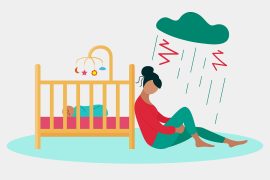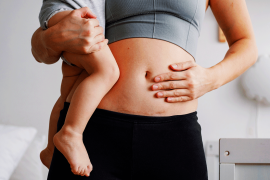Welcome to a journey of tranquility and well-being as you embark on one of life’s most remarkable experiences – pregnancy. In this phase, your body and mind undergo profound changes, making it a perfect time to explore the gentle power of Mindfulness and Relaxation Techniques. These practices are not just about finding peace in the midst of transformation; they’re about nurturing yourself and your growing baby with every breath and moment of calm.
Mindfulness: A Gentle Embrace for You and Your Baby
Mindfulness is the art of being present and fully engaged in the here and now, without judgment or distraction. During pregnancy, this practice transforms into a beautiful dialogue between you and your unborn child. It’s about being aware of your body’s changes, tuning into your baby’s movements, and connecting deeply with the life inside you. This intentional awareness can significantly reduce stress, a common companion during pregnancy. By embracing mindfulness, you cultivate a sense of calm and balance, essential for your emotional well-being and that of your baby.
Relaxation: A Soothing Balm for Body and Mind
Relaxation techniques, ranging from deep breathing to gentle stretches, offer a respite from the physical and emotional demands of pregnancy. These methods help in easing common discomforts like back pain and fatigue, and in promoting better sleep. More importantly, they play a crucial role in managing stress and anxiety. High stress levels can impact fetal health, making relaxation not just beneficial but vital. By incorporating relaxation into your daily life, you’re taking a proactive step towards a healthier and more comfortable pregnancy.
Simple, Safe, and Integrative Practices
The beauty of mindfulness and relaxation lies in their simplicity and safety. These techniques require no special equipment or previous experience. Whether it’s a few minutes of focused breathing, a mindful walk in nature, or a simple relaxation exercise before bed, these practices can seamlessly integrate into your daily routine. They are adaptable to your unique pregnancy journey, offering flexibility and ease.
Understanding the Benefits
Pregnancy is a time of profound transformation, where both your body and mind undergo significant changes. These changes, while remarkable, can also be sources of stress and anxiety.
The Transformative Journey of Pregnancy
Physiologically, your body is creating a new life, which involves numerous physical changes. Hormonal fluctuations can affect your mood and emotions. You might experience discomforts like nausea, back pain, or fatigue. As your body changes, you may also grapple with concerns about your health, labor, and the responsibilities of parenthood.
Psychologically, pregnancy can be an emotional rollercoaster. You might feel joy and excitement one moment, and anxiety or uncertainty the next. Concerns about the baby’s health, changes in your relationships, and adjustments to your identity as a mother can all contribute to heightened stress levels.
The Calming Power of Mindfulness and Relaxation
Mindfulness and relaxation techniques offer a pathway to manage these stresses. By focusing on the present moment and your bodily sensations in a non-judgmental way, mindfulness can help you navigate the emotional landscape of pregnancy with greater ease. It encourages a deep connection with your body, fostering a sense of peace and acceptance.
Relaxation techniques, such as deep breathing or progressive muscle relaxation, can reduce physical tension and lower stress hormones like cortisol. This not only improves your emotional state but can also have a positive impact on your baby’s development.
Evidence-Based Benefits
Several studies underscore the benefits of these practices during pregnancy. For instance, research published in the journal “Obstetrics & Gynecology” found that mindfulness and relaxation can lead to reduced prenatal stress, lower risk of preterm birth, and improved outcomes for the baby. Another study in the “Journal of Psychosomatic Obstetrics & Gynecology” highlighted that mindfulness practices can decrease the severity of pregnancy-related anxiety and depression.
Experts in prenatal care also advocate for these practices. Renowned obstetricians and mental health professionals emphasize the dual benefits of mindfulness and relaxation for both the mother and the developing fetus. They note that these practices can improve sleep, enhance the maternal-fetal bond, and prepare mothers for the challenges of labor and motherhood.

Simple Mindfulness Techniques for Expectant Mothers
- Mindful Breathing:
- Find a comfortable seat.
- Close your eyes and take deep, slow breaths.
- Focus on the sensation of air entering and leaving your nose or mouth.
- If your mind wanders, gently bring your attention back to your breath.
- Practice for just a few minutes daily.
- Mindful Walking:
- Choose a quiet place for a short walk.
- Walk slowly, paying attention to the sensation of your feet touching the ground.
- Observe the environment – the sounds, smells, and sights.
- If distracted, gently redirect your focus to the act of walking.
- Even a 5-minute walk can be refreshing.
Relaxation Techniques for Everyday Relief
- Progressive Muscle Relaxation:
- Find a comfortable position, sitting or lying down.
- Starting at your feet, tense each muscle group for 5 seconds, then relax for 30 seconds.
- Progressively move up the body: calves, knees, thighs, and so on, up to your face.
- Focus on the feeling of release in each muscle.
- Practice for 10-15 minutes.
- Guided Imagery:
- Sit or lie in a comfortable position.
- Close your eyes and imagine a peaceful scene, like a beach or a forest.
- Engage all your senses – visualize the scenery, hear the sounds, smell the environment.
- Allow this scene to replace anxious thoughts, focusing on the calmness it brings.
- Spend 5-10 minutes in this imaginative state.
Integrate these techniques into your daily routine, such as during short breaks or before bedtime, to help reduce stress and promote relaxation.
How Creating a Mindful Environment at Home?
- Peaceful Space:
- Designate a quiet corner for relaxation and mindfulness practices.
- Add comfortable cushions or a chair.
- Include calming elements like soft lighting, plants, or gentle music.
- Keep the space clutter-free to promote a sense of tranquility.
- Support System:
- Share your mindfulness journey with your partner or family members.
- Encourage them to join you in practices or respect your quiet time.
- Discuss how mindfulness can benefit the whole family.
- Create a routine where mindfulness is a shared activity, fostering a supportive and understanding home environment.
What are the Common Concerns and Safety?
Addressing Concerns:
- Physical Strain: Mindfulness and relaxation practices are low-impact and gentle, posing minimal risk of physical strain. However, always listen to your body and modify practices as needed.
- Time Constraints: These practices can be as short as a few minutes and easily integrated into your daily routine, making them feasible even for busy schedules.
- Effectiveness Doubts: While the benefits of mindfulness may not be immediately noticeable, consistent practice can lead to significant improvements in stress management and emotional well-being.
Safety and Ease:
- Safety: Mindfulness and relaxation techniques are generally safe for pregnant women. However, if you have specific health concerns, consult your healthcare provider.
- Simplicity: These practices require no special equipment or previous experience. They are easily accessible and can be adapted to suit your comfort level.
Conclusion:
Embarking on the journey of mindfulness and relaxation during pregnancy is a beautiful way to enhance your well-being and connect deeply with your baby. These simple, safe, and flexible practices can be seamlessly integrated into your daily life, offering a sanctuary of calm in the midst of the transformative experience of pregnancy. Remember, taking care of your mental and emotional health is as important as physical care. By nurturing your mind and spirit through mindfulness and relaxation, you are setting the foundation for a healthy, joyful pregnancy and the wonderful journey of motherhood that follows.






